 There's that old saw: "They just don't make them like that anymore." And, when you're talking about the late 1980s and early 1990s trend toward high-end erotic thrillers, you just have to say: "Thank goddess!" It's an era bracketed in some ways by two unusual supporting actress nominations -- Anne Archer in 1987 for Fatal Attraction and the nomination of...
There's that old saw: "They just don't make them like that anymore." And, when you're talking about the late 1980s and early 1990s trend toward high-end erotic thrillers, you just have to say: "Thank goddess!" It's an era bracketed in some ways by two unusual supporting actress nominations -- Anne Archer in 1987 for Fatal Attraction and the nomination of...
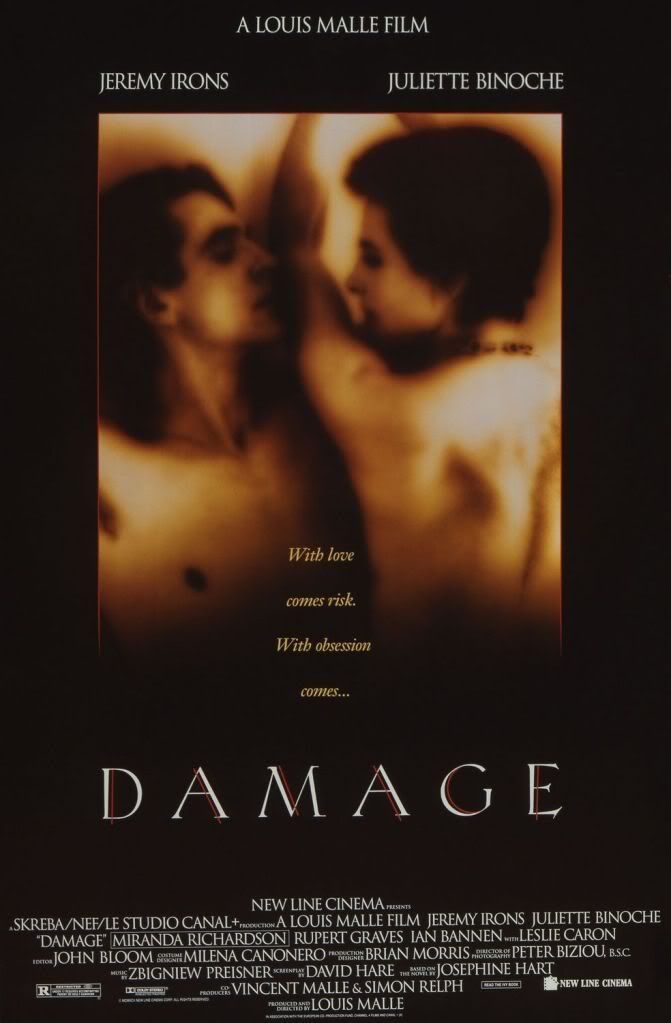
...Miranda Richardson in Damage (1992)
approximately 21 minutes and 40 seconds
20 scenes
roughly 17% of film's total running time
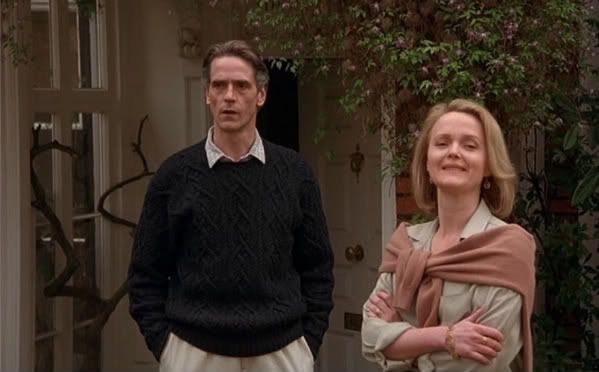 Richardson's Ingrid appears by most counts to be adequately happy in her life as a wife and mother.She's devoted to her adult son Martyn (Rupert Graves, a classic example of early 1990s cuteness) and is doing her best to stay patient with her moody teen daughter.
Richardson's Ingrid appears by most counts to be adequately happy in her life as a wife and mother.She's devoted to her adult son Martyn (Rupert Graves, a classic example of early 1990s cuteness) and is doing her best to stay patient with her moody teen daughter.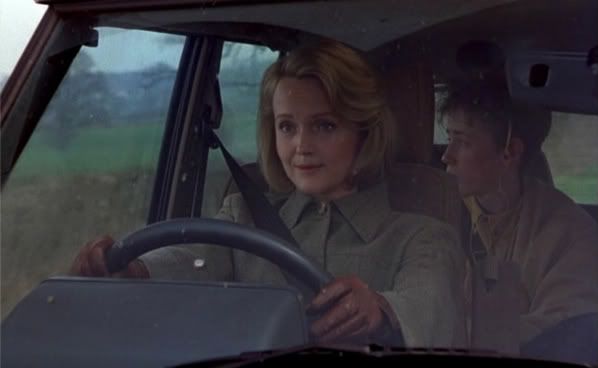 Throughout, Richardson's Ingrid seems utterly confident that she and Stephen are a basically good couple, doing their solid best to balance the complex demands of career and family.
Throughout, Richardson's Ingrid seems utterly confident that she and Stephen are a basically good couple, doing their solid best to balance the complex demands of career and family.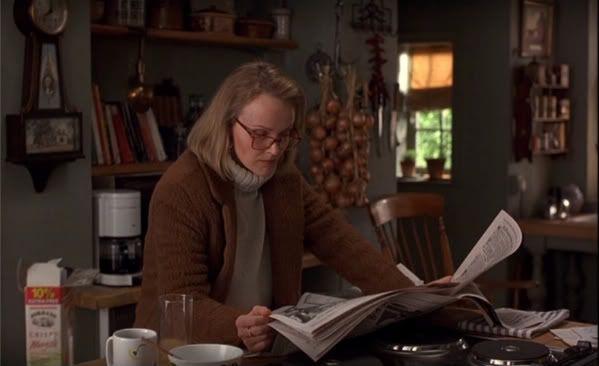 Richardson's Ingrid also appears utterly oblivious to Stephen's mounting obsession with his lover, Anna (a cardboard cutout purported to be Juliette Binoche).
Richardson's Ingrid also appears utterly oblivious to Stephen's mounting obsession with his lover, Anna (a cardboard cutout purported to be Juliette Binoche).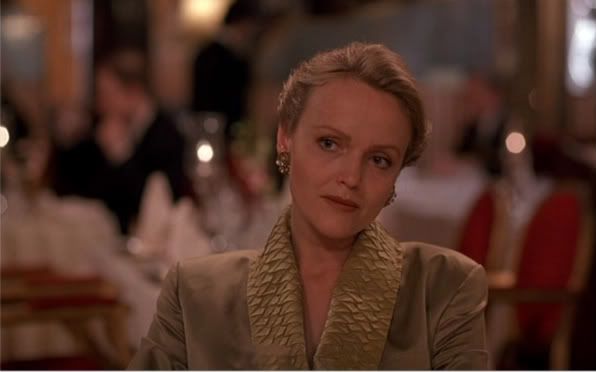 This is not to say that Richardson's Ingrid likes Anna -- who (in addition to being her husband's secret lover) also happens to be Martyn's new flame. To the contrary, Richardson carefully scores the many ways that Ingrid mistrusts "something" about Anna and also how Ingrid forges past such concerns as she does her best to support her beloved son.
This is not to say that Richardson's Ingrid likes Anna -- who (in addition to being her husband's secret lover) also happens to be Martyn's new flame. To the contrary, Richardson carefully scores the many ways that Ingrid mistrusts "something" about Anna and also how Ingrid forges past such concerns as she does her best to support her beloved son.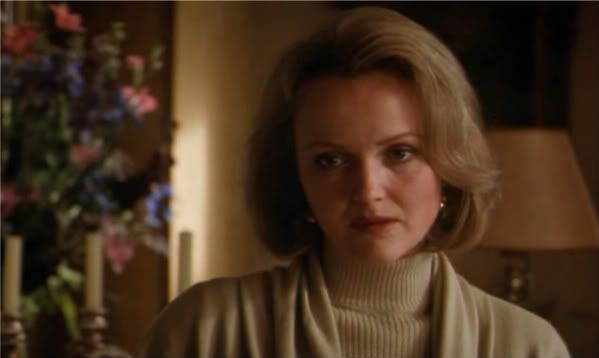 Likewise, the fact that Ingrid remains oblivious to Stephen's affair is also not to say that she's unaware that something's off about Stephen.
Likewise, the fact that Ingrid remains oblivious to Stephen's affair is also not to say that she's unaware that something's off about Stephen.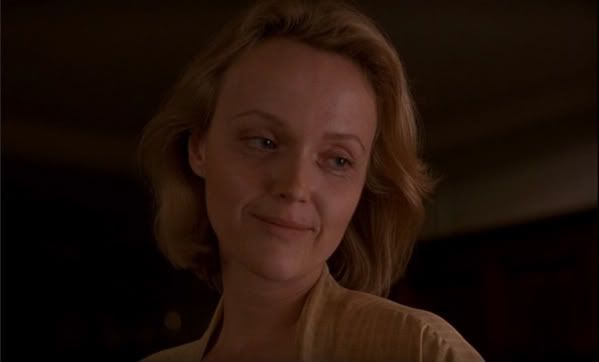 Indeed, Richardson gracefully notes the many ways Ingrid recognizes her husband's distraction, preoccupation and odd behavior, suggesting that Ingrid's aware of the distance growing between her and her husband even as she struggles (sometimes half-heartedly) to do something about it.
Indeed, Richardson gracefully notes the many ways Ingrid recognizes her husband's distraction, preoccupation and odd behavior, suggesting that Ingrid's aware of the distance growing between her and her husband even as she struggles (sometimes half-heartedly) to do something about it.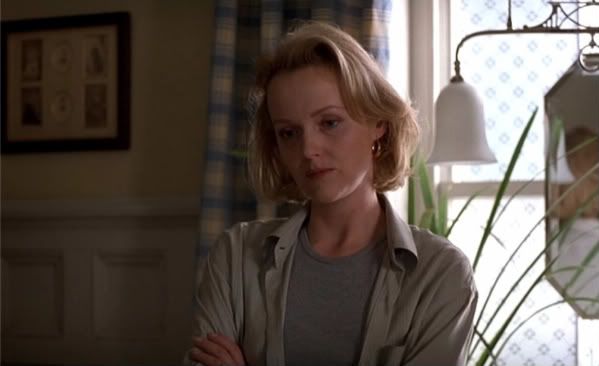 In so doing, Richardson's characterization of Ingrid deftly demonstrates how an intelligent, intuitive woman might "not see" her husband's conspicuous infidelity as it also provides a compelling foundation for the emotional fireworks that are to follow.
In so doing, Richardson's characterization of Ingrid deftly demonstrates how an intelligent, intuitive woman might "not see" her husband's conspicuous infidelity as it also provides a compelling foundation for the emotional fireworks that are to follow.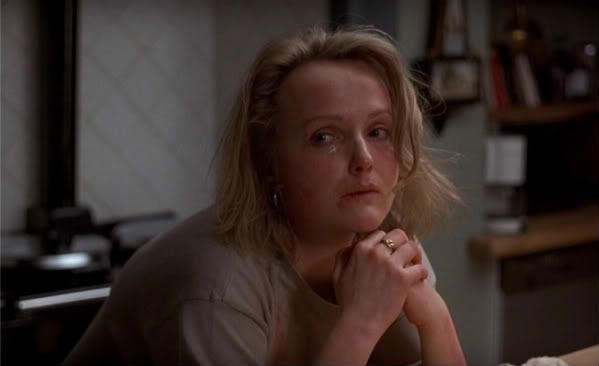 Because this is a narrative about the "damage" wrought by erotic obsession, Stephen's affair with Anna is discovered in an especially tragic way. The tragedy of the revelation provides the impetus for a series of scenes in which Ingrid must travel a startling gamut of emotions.
Because this is a narrative about the "damage" wrought by erotic obsession, Stephen's affair with Anna is discovered in an especially tragic way. The tragedy of the revelation provides the impetus for a series of scenes in which Ingrid must travel a startling gamut of emotions.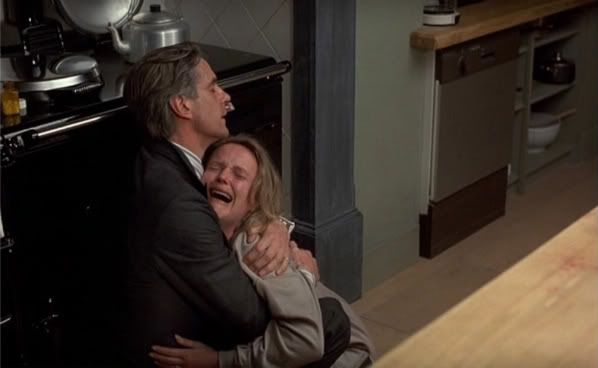 This series of scenes marks very different moments in a life-changing 24-hours for Ingrid but, because director Louis Malle strings them together in a nearly continuous 5-minute block of time, the sequence becomes one concentrated portrait of Ingrid's devastation. And Miranda Richardson nails each emotional note on the Kubler-Ross spectrum: anger...
This series of scenes marks very different moments in a life-changing 24-hours for Ingrid but, because director Louis Malle strings them together in a nearly continuous 5-minute block of time, the sequence becomes one concentrated portrait of Ingrid's devastation. And Miranda Richardson nails each emotional note on the Kubler-Ross spectrum: anger...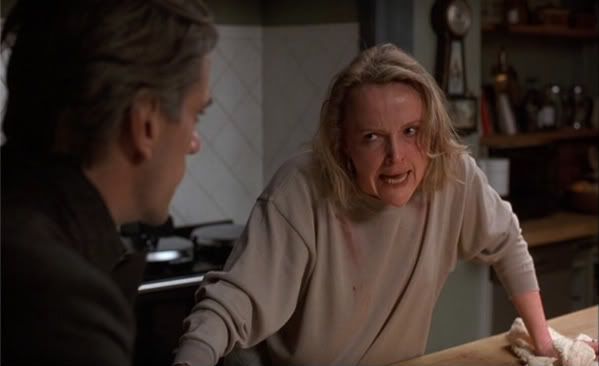 depression...
depression...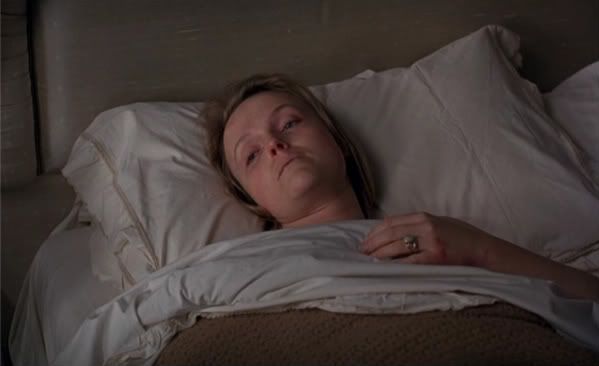 denial...
denial...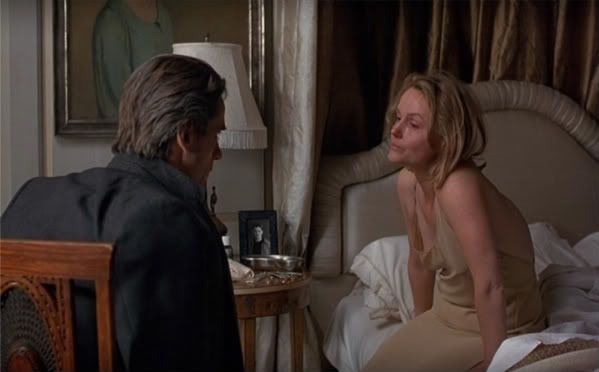 bargaining...
bargaining...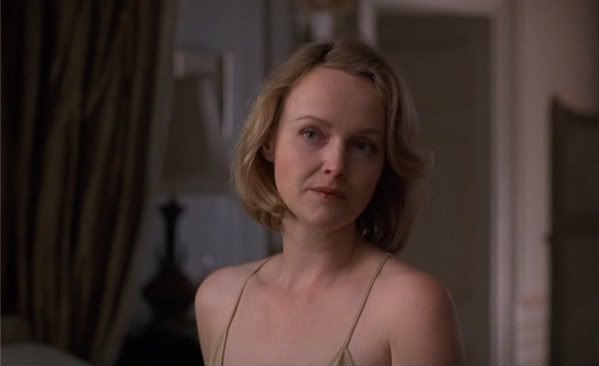 acceptance.
acceptance.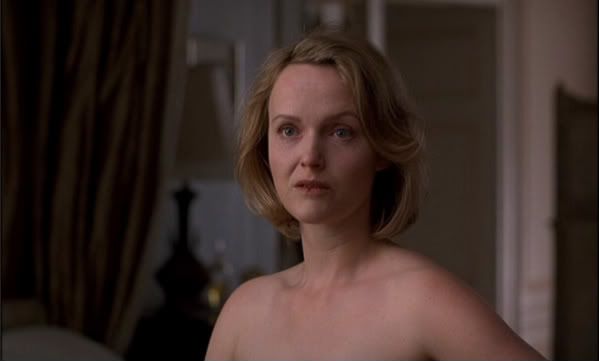 All told, Miranda Richardson's performance as Ingrid provides a sympathetic anchor for this meandering, misanthropic film. At her most galvanic, she's extraordinary -- intelligent, layered, nuanced -- elsewhere, though, Richardson's performance remains confined by the sketchiness of the screenplay's treatment of the character. Indeed, if anything, the performance suffers because Richardson did almost too perfect a job of coloring "inside" the broad outlines of this wan stock character. The nuance, the texture, the shading -- all top-notch. But I'm left with little real sense of who this woman is beyond her narrative function as the sympathetic, wounded wife.
All told, Miranda Richardson's performance as Ingrid provides a sympathetic anchor for this meandering, misanthropic film. At her most galvanic, she's extraordinary -- intelligent, layered, nuanced -- elsewhere, though, Richardson's performance remains confined by the sketchiness of the screenplay's treatment of the character. Indeed, if anything, the performance suffers because Richardson did almost too perfect a job of coloring "inside" the broad outlines of this wan stock character. The nuance, the texture, the shading -- all top-notch. But I'm left with little real sense of who this woman is beyond her narrative function as the sympathetic, wounded wife.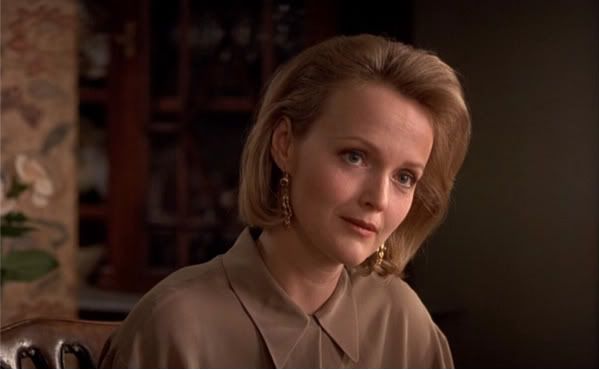 That said, Miranda Richardson's work in the role of Ingrid -- especially her wrenching scenes of grief and betrayal -- provides the singular note of grace within this otherwise graceless film.
That said, Miranda Richardson's work in the role of Ingrid -- especially her wrenching scenes of grief and betrayal -- provides the singular note of grace within this otherwise graceless film.

5 comments:
I still wish Miranda had been nominated for The Crying Game instead - that was a much meatier role in a much better film, and would have been a better representation of the amazing hat trick she pulled off that year.
I have to agree. And I think that fact is especially clear in retrospect.
I remember liking this performance much more the 1st time around. and, as I said in the smackdown, those morning after scenes seemed very disconnected to the big kitchen moment. also, before they go to the funeral, when she talks to her father - she seemed so distant from the son's death. It didn't feel right, nor believable.
and, come on, you could've shown a photo with the boobs :D
she won me over when she threw salt over her shoulder while cleaning the wine spill at the country cottage. she does it so automatically, as one with a built-in superstition would, with no thought to it. reminded me of an aunt of mine. hers was probably my favorite out of the ones I've seen.
Excellent analysis of this performance -- love it.
Post a Comment